|
|
STORY HIGHLIGHTS
- Bill Gates: IBM designer insisted on triple-key login on PCs for security reasons
- But Gates says Control-Alt-Delete was a "mistake"
- The designer credited with the shortcut has deflected responsibility
- Gates made comments at a recent Harvard University event
The Microsoft founder says the triple-key login should have been made easier, à la Apple's Macs, but that a designer insisted on the more complicated step.
"We could have had a single button. But the guy who did the IBM keyboard design didn't want to give us our single button," Gates said Saturday during a question-and-answer session to launch a Harvard University fund-raising campaign. His comments have gained attention since a video of his Harvard Q&A was posted on YouTube on Tuesday.
Smiling, Gates tried to follow through on the thought, noting it was a basic security feature. But he eventually surrendered to common sense.
"And so we had ... we programmed at a low level that you had to ... it was a mistake," he said, throwing up his hands to laughter and applause from the crowd.
Gates defended innovation on the earliest Microsoft software though.
"We did some clever stuff," he said. "We were able to experiment with a lot of stuff, but more on the software side than the hardware."
Long the first interface step for PC users, Control-Alt-Delete still exists in Windows 8 as a way of either locking the computer or accessing the control panel. While the system defaults to a log-in screen, users may tweak their settings to return to the old way of logging on to Windows.
Sometimes informally called the "three-fingered salute," the login required users to use both hands and was intended to avoid accidental keystrokes from rebooting a computer.
Engineer David Bradley, a designer on early IBM computers, said he invented the combination as a shortcut during development.
"I originally intended for it to be what we would now call an Easter egg -- just something we were using in development and it wouldn't be available elsewhere," Bradley said while appearing on a 2011 panel that included Gates. "But then (software publishers) found out about it. They were trying to figure out how to tell somebody to start up one of their programs, and they had the answer. Just put the diskette in, hit Control-Alt-Delete, and by magic your program starts."
He then tried to deflect what he perhaps wryly called "credit" for its continued use.
"It was like a five-minute job in doing it. I didn't realize that I was going to create a cultural icon when I did it," he said "... I may have invented it, but I think Bill made it famous."
A tight-lipped Gates appears to force a smile in a video of the panel but does not respond.
Gates attended Harvard until he left during his junior year to start Microsoft with Paul Allen in 1975. While at Harvard, he lived down the hall from current Microsoft CEO Steve Ballmer. Gates received an honorary degree in 2007.
Gates remains Microsoft's chairman although he stopped full-time work at the company in 2008.
During Saturday's session, Gates reflected on a variety of topics, from the philanthropy he's made his life's work since stepping back from an active role at Microsoft to his company's relationship with Apple in the early days.
That included helping keep what would become Microsoft's fiercest rival afloat in the 1990s when it was foundering.
"In the Apple II era, we were kind of friendly competitors," he said. "We actually put more people on the Mac than Apple had."
When co-founder Steve Jobs returned to Apple in 1996, "he sort of says, 'I want this, this and this and I'll give you this, this and this.' ... We did the deal in three days," Gates said.
That included buying a 6% share of Apple, which lawyers convinced Gates that Microsoft shouldn't keep for antitrust reasons.
"It would have been nice if we had," he said.
From Around the Web
- Are Smartphones On Their Way Out?Enterprise Mobile Hub
- Tina Fey: 'My Daughter Might Be A Sociopath'Elizabeth Street
More from CNN
- Vince Gill confronts Westboro Baptist protestersCNN The Marquee Blog




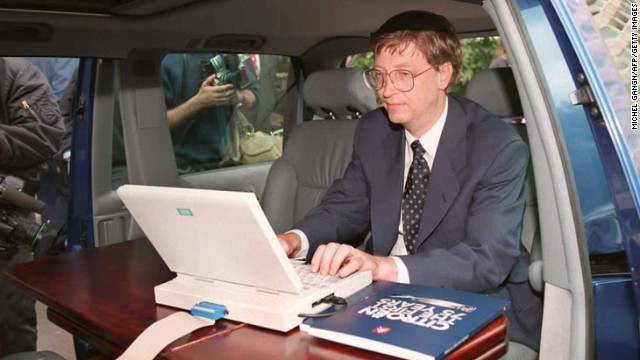 Microsoft president Bill Gates demonstrates Microsoft's Windows 95 program from his automobile prior to a press conference in Paris in September 1994.
Microsoft president Bill Gates demonstrates Microsoft's Windows 95 program from his automobile prior to a press conference in Paris in September 1994.
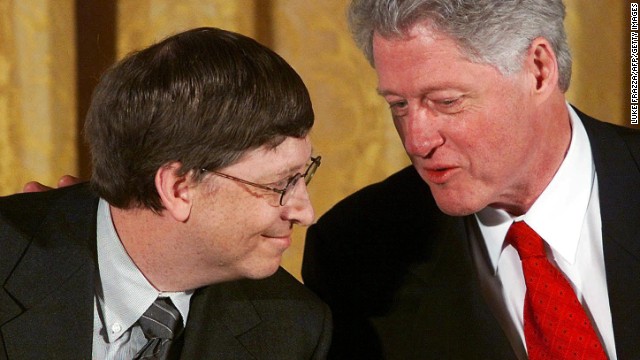 Gates and former US President Bill Clinton attend a White House conference on "the New Economy" in April 2000.
Gates and former US President Bill Clinton attend a White House conference on "the New Economy" in April 2000.
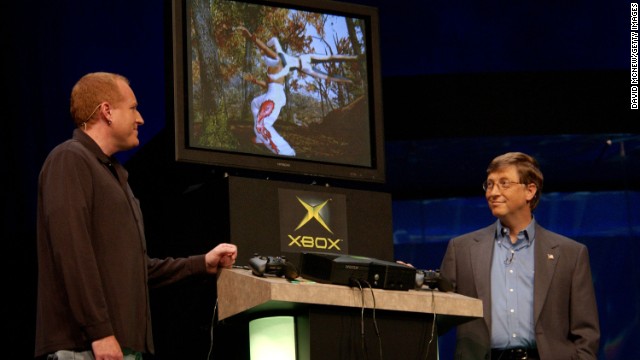 Gates watches Microsoft's Seamus Blackley present a game under development for Microsoft's Xbox in 2001 at the Comdex computer show.
Gates watches Microsoft's Seamus Blackley present a game under development for Microsoft's Xbox in 2001 at the Comdex computer show.
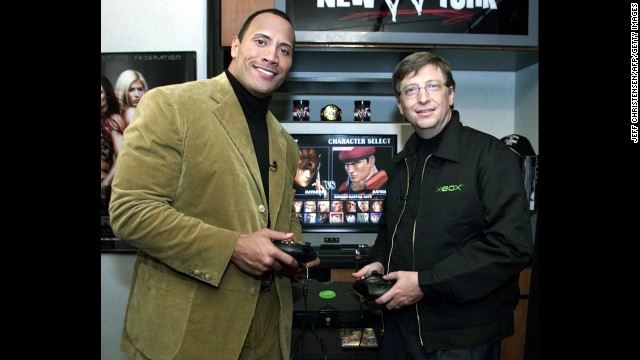 Gates plays an Xbox game with World Wrestling Federation (now WWE) star Duane "The Rock" Johnson in 2001 at the gaming console's launch.
Gates plays an Xbox game with World Wrestling Federation (now WWE) star Duane "The Rock" Johnson in 2001 at the gaming console's launch.
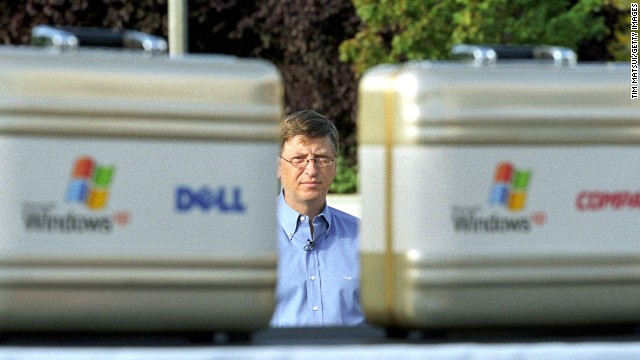 Gates waits to go onstage at the release of the Windows XP operating system August 24, 2001 in Redmond, Washington.
Gates waits to go onstage at the release of the Windows XP operating system August 24, 2001 in Redmond, Washington.
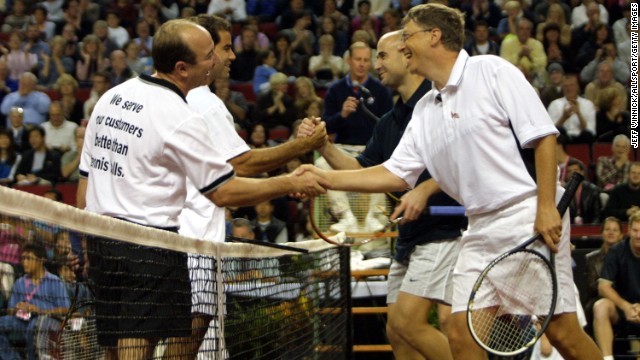 Tennis greats Andre Agassi and Pete Sampras shake hands at the net, as Gates and Amazon founder Jeff Bezos do the same, at a celebrity match in Seattle in 2001.
Tennis greats Andre Agassi and Pete Sampras shake hands at the net, as Gates and Amazon founder Jeff Bezos do the same, at a celebrity match in Seattle in 2001.
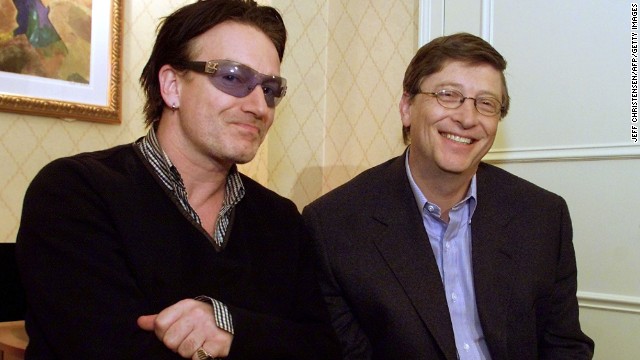 U2 frontman Bono and Gates sit together before a news conference at the World Economic Forum in New York, in February, 2002.
U2 frontman Bono and Gates sit together before a news conference at the World Economic Forum in New York, in February, 2002.
 Gates speaks at the U..S District Courthouse in Washington, D.C. after a 2002 hearing into Microsoft's violation of antitrust laws.Gates told an antitrust hearing that his company would "be greatly devalued" if a proposed antitrust remedy from a group of nine states was implemented.
Gates speaks at the U..S District Courthouse in Washington, D.C. after a 2002 hearing into Microsoft's violation of antitrust laws.Gates told an antitrust hearing that his company would "be greatly devalued" if a proposed antitrust remedy from a group of nine states was implemented.
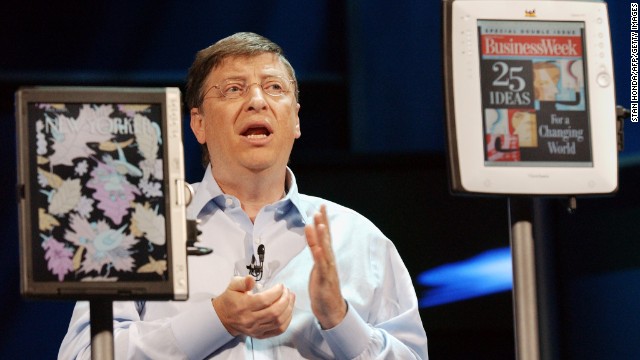 Gates speaks, standing between two models of the Tablet PC, at the announcement of the availability of the devices and Windows XP Tablet PC operating system in 2002.
Gates speaks, standing between two models of the Tablet PC, at the announcement of the availability of the devices and Windows XP Tablet PC operating system in 2002.
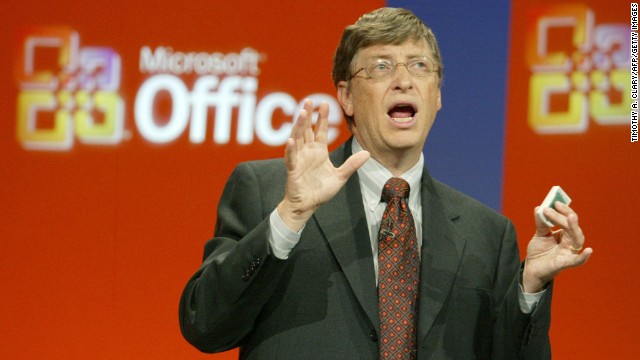 Gates delivers a speech to unveil the new Microsoft Office system during a presentation in New York in October 2003. He called that version of Office one of the most important updates in the company's history.
Gates delivers a speech to unveil the new Microsoft Office system during a presentation in New York in October 2003. He called that version of Office one of the most important updates in the company's history.
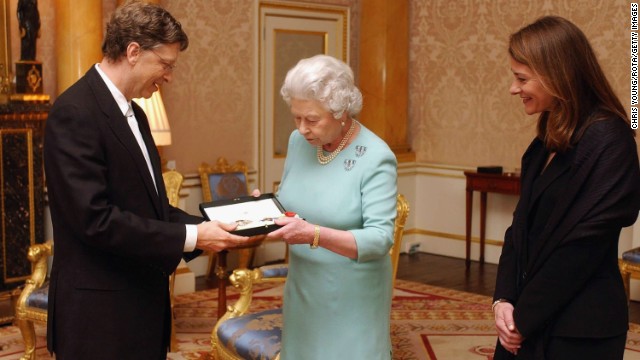 Britain's Queen Elizabeth II presents Gates with his honorary knighthood, as his wife, Melinda Gates, watches. Despite the 2005 honor, Gates can't use the title "Sir," because he's not a British citizen.
Britain's Queen Elizabeth II presents Gates with his honorary knighthood, as his wife, Melinda Gates, watches. Despite the 2005 honor, Gates can't use the title "Sir," because he's not a British citizen.
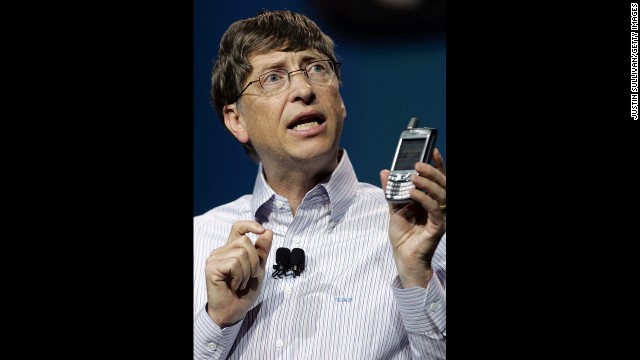 Gates holds a new Palm Treo 700w smartphone during a keynote address at the 2006 Consumer Electronics Show in Las Vegas.
Gates holds a new Palm Treo 700w smartphone during a keynote address at the 2006 Consumer Electronics Show in Las Vegas.
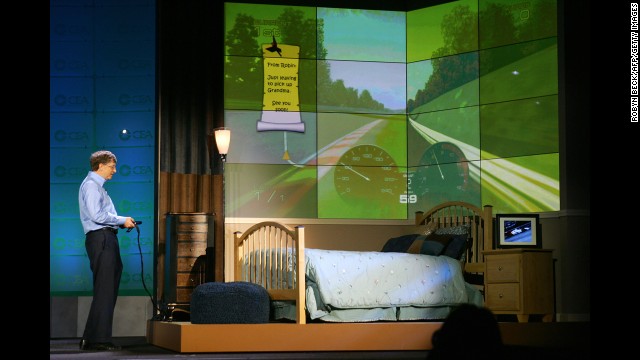 Microsoft chairman and CEO Bill Gates shows his vision of the interactive bedroom of the future, during the keynote address at the Consumer Electronics Show in 2007.
Microsoft chairman and CEO Bill Gates shows his vision of the interactive bedroom of the future, during the keynote address at the Consumer Electronics Show in 2007.
 Gates speaks during the press conference at the Microsoft Windows Vista operating system launch in 2007.
Gates speaks during the press conference at the Microsoft Windows Vista operating system launch in 2007.
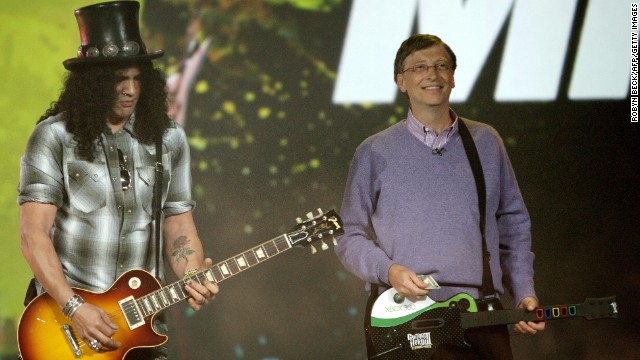 Rockin'! Gates plays Guitar Hero as legendary Guns 'N' Roses guitarist Slash plays a real guitar during Gates pre-show keynote address at the 2008 Consumer Electronics Show.
Rockin'! Gates plays Guitar Hero as legendary Guns 'N' Roses guitarist Slash plays a real guitar during Gates pre-show keynote address at the 2008 Consumer Electronics Show.















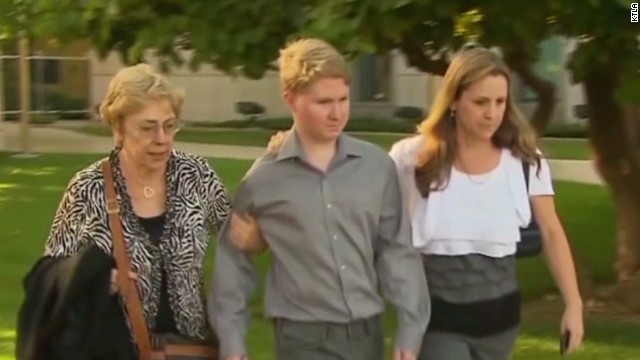
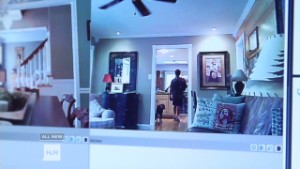
 © EFE
© EFE


 Woods fue elegido como el mejor del PGA edición 2013.
Woods fue elegido como el mejor del PGA edición 2013. 
Ads by Google